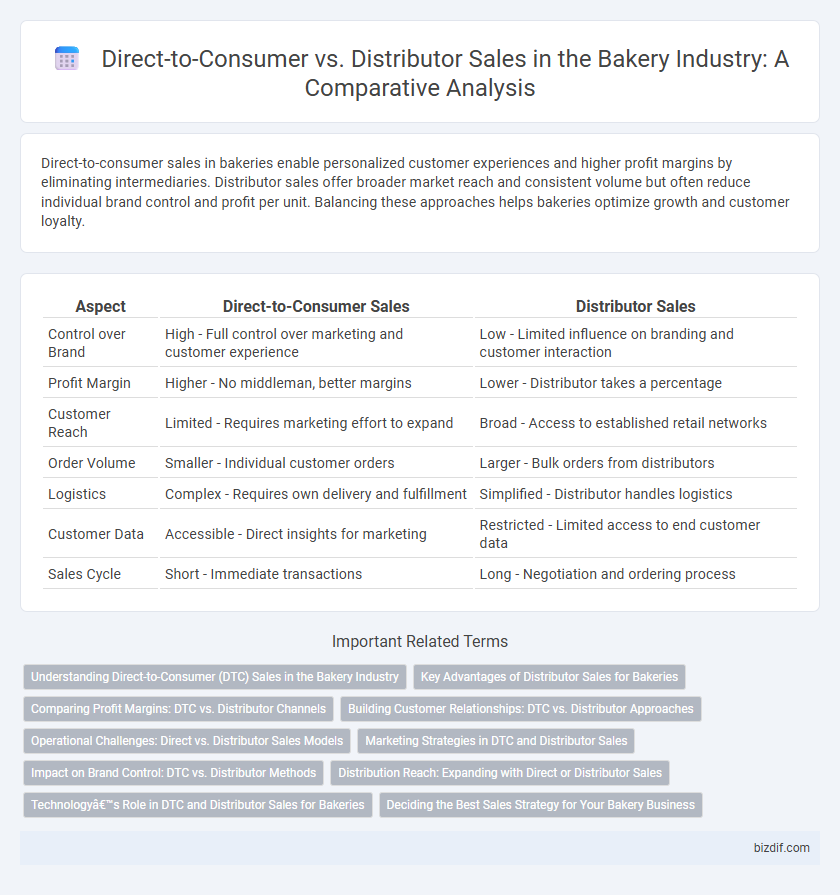Direct-to-consumer sales in bakeries enable personalized customer experiences and higher profit margins by eliminating intermediaries. Distributor sales offer broader market reach and consistent volume but often reduce individual brand control and profit per unit. Balancing these approaches helps bakeries optimize growth and customer loyalty.
Table of Comparison
| Aspect | Direct-to-Consumer Sales | Distributor Sales |
|---|---|---|
| Control over Brand | High - Full control over marketing and customer experience | Low - Limited influence on branding and customer interaction |
| Profit Margin | Higher - No middleman, better margins | Lower - Distributor takes a percentage |
| Customer Reach | Limited - Requires marketing effort to expand | Broad - Access to established retail networks |
| Order Volume | Smaller - Individual customer orders | Larger - Bulk orders from distributors |
| Logistics | Complex - Requires own delivery and fulfillment | Simplified - Distributor handles logistics |
| Customer Data | Accessible - Direct insights for marketing | Restricted - Limited access to end customer data |
| Sales Cycle | Short - Immediate transactions | Long - Negotiation and ordering process |
Understanding Direct-to-Consumer (DTC) Sales in the Bakery Industry
Direct-to-consumer (DTC) sales in the bakery industry enable bakeries to build direct relationships with customers, enhancing brand loyalty and receiving immediate feedback on products. This model reduces dependency on intermediaries, thus increasing profit margins and allowing for greater control over product quality, pricing, and customer experience. Leveraging online platforms and local delivery services, bakeries can efficiently reach target audiences and adapt swiftly to consumer preferences and market trends.
Key Advantages of Distributor Sales for Bakeries
Distributor sales offer bakeries expanded market reach by leveraging established networks with retailers, cafes, and restaurants, which helps increase product visibility and volume. Utilizing distributors reduces the logistical burden on bakeries, allowing them to focus on production quality and innovation. Distributors also bring valuable market insights and demand forecasting, enhancing sales efficiency and minimizing inventory risks.
Comparing Profit Margins: DTC vs. Distributor Channels
Direct-to-consumer (DTC) bakery sales typically yield higher profit margins by eliminating intermediaries, allowing bakeries to retain full retail pricing and build direct customer relationships. Distributor channels often involve lower margins due to wholesale pricing and distributor fees but provide broader market reach and volume sales. Balancing DTC's higher per-unit profitability with distributor-driven scale is critical for maximizing overall bakery profitability.
Building Customer Relationships: DTC vs. Distributor Approaches
Direct-to-consumer (DTC) bakery sales allow businesses to establish personal connections through customized interactions, feedback loops, and loyalty programs, fostering brand trust and repeat purchases. Distributor sales, while expanding reach rapidly, often limit direct engagement with end customers, making it challenging to build personalized relationships and capture detailed consumer insights. Leveraging a DTC approach provides bakeries with valuable data to tailor products and marketing strategies, enhancing customer satisfaction and lifetime value.
Operational Challenges: Direct vs. Distributor Sales Models
Direct-to-consumer bakery sales demand robust order management systems and efficient last-mile delivery logistics to ensure product freshness and customer satisfaction. Distributor sales alleviate some operational burdens by handling inventory storage and bulk distribution, but introduce complexities in demand forecasting and maintaining consistent product quality across multiple retail outlets. Balancing these operational challenges requires bakeries to optimize supply chain coordination, quality control measures, and communication channels tailored to each sales model.
Marketing Strategies in DTC and Distributor Sales
Direct-to-consumer (DTC) bakery sales leverage personalized marketing strategies such as targeted social media campaigns, email newsletters, and influencer partnerships to build direct customer relationships and improve brand loyalty. Distributor sales focus on bulk marketing efforts, including trade shows, distributor networks, and retail partnerships to maximize market reach and shelf presence. DTC strategies enable precise customer data collection for tailored promotions, while distributor sales rely on volume discounts and branding consistency to drive large-scale distribution.
Impact on Brand Control: DTC vs. Distributor Methods
Direct-to-consumer (DTC) sales in the bakery industry offer unparalleled brand control, allowing bakers to craft personalized customer experiences and maintain consistent product presentation. Distributor sales, while expanding market reach, often dilute brand messaging due to third-party packaging and limited direct customer interaction. Maintaining brand integrity is more manageable through DTC channels, which enable direct feedback loops and tailored marketing strategies.
Distribution Reach: Expanding with Direct or Distributor Sales
Distributors enable bakeries to rapidly expand their distribution reach by leveraging established networks across multiple retail locations and regions, increasing product visibility and customer access. Direct-to-consumer sales offer bakeries the ability to target niche markets and build brand loyalty through personalized experiences and exclusive product offerings. Balancing direct and distributor sales strategies maximizes market penetration while maintaining control over brand messaging and customer engagement.
Technology’s Role in DTC and Distributor Sales for Bakeries
Technology enhances direct-to-consumer (DTC) sales for bakeries by enabling online ordering platforms, personalized marketing through data analytics, and seamless payment processing, which improve customer engagement and retention. In distributor sales, inventory management software and demand forecasting tools streamline supply chain operations, ensuring timely deliveries and reducing waste. Advanced CRM systems integrate both sales channels, allowing bakeries to optimize product availability and customer service across DTC and distributor networks efficiently.
Deciding the Best Sales Strategy for Your Bakery Business
Choosing between direct-to-consumer and distributor sales impacts bakery profit margins and brand control. Direct sales offer higher margins and direct customer feedback, ideal for artisanal or specialty bakeries, while distributors expand market reach and volume but reduce per-unit revenue. Bakers should analyze target audience, production capacity, and marketing resources to determine the optimal sales approach for sustained growth.
Direct-to-consumer vs Distributor sales Infographic

 bizdif.com
bizdif.com